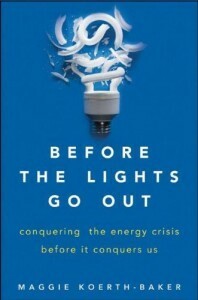Take a photo of a barcode or cover
7 reviews for:
Before the Lights Go Out: Conquering the Energy Crisis Before It Conquers Us
Maggie Koerth-Baker
7 reviews for:
Before the Lights Go Out: Conquering the Energy Crisis Before It Conquers Us
Maggie Koerth-Baker
A thin book that contains mind-changing information and a basis for discussion for energy policy in a non-partisan way.
--I generally try to critique books based on whether they achieved what they set out to achieve, and if I solely based it on that, it's be a five-star book. But. It seemed like the goal of this book was to present the complexity of the energy issue, and it did so in an overly simplistic manner. Maybe I just can't explain this properly. But if you want to present how overwhelmingly complex the situation is, and how urgent, should the book in the end give the impression that it's all okay, we can do this, no problemo? I can point to lots of places where she says things that say "it's not going to be easy," but the tone of the book is a bunch of feel-good pablum.
Maybe this wasn't the book for me. I already buy into the idea that we need to spend money on infrastructure and efficiency. But I felt talked down to, pumped up - manipulated.
I recommend it - it's a decent introduction to the conversation. But it's not there to provide more than a primer, if that.
--I generally try to critique books based on whether they achieved what they set out to achieve, and if I solely based it on that, it's be a five-star book. But. It seemed like the goal of this book was to present the complexity of the energy issue, and it did so in an overly simplistic manner. Maybe I just can't explain this properly. But if you want to present how overwhelmingly complex the situation is, and how urgent, should the book in the end give the impression that it's all okay, we can do this, no problemo? I can point to lots of places where she says things that say "it's not going to be easy," but the tone of the book is a bunch of feel-good pablum.
Maybe this wasn't the book for me. I already buy into the idea that we need to spend money on infrastructure and efficiency. But I felt talked down to, pumped up - manipulated.
I recommend it - it's a decent introduction to the conversation. But it's not there to provide more than a primer, if that.
Excellent book for everyone who cares about the future of energy use. Diligently explains that there is no magic bullet to save us, but rather a combination of current and better technologies and infrastructure changes can revamp our energy use to build a sustainably powered future.
I heard about this book through boingboing.net, of which Maggie Koerth-Baker is a regular contributor. This work is her summation of the structure of the United States' energy production and distribution systems, and also her ideas about how we're going to have to adapt both in a hotter, more expensive, more populated word in the coming years.
I haven't taken a science or math class in 10+ years, but I found this book very easy and enjoyable to read. It's also short - I finished it in a few days - but it crams a lot of information into its pages. It's written in a clear style and intended for the average reader who is concerned about energy use but doesn't know much about how it's made or consumed in the US. Koerth-Baker manages to describe very complex systems - how we make our energy, how it moves across the country, how it stacks up against the use of other nations - in very easy-to-understand ways.
Usually debates about energy and/or climate get polarized and indignant pretty quickly. This book is mostly about the former, and Koerth-Baker manages to keep discussion surrounding energy politically neutral for pretty much the whole book, which is to be commended. Instead of looking at this issue from a "put a sweater on" vs. "drill, baby, drill!" perspective, Koerth-Baker looks at why diversifying our energy sources and improving our distribution infrastructure in a smart, engineered way will be better economically on a local scale, will allow us to continue to grow and prosper as a nation without depriving ourselves of modern comforts, and will avoid sticking future generations with a hot, destroyed planet and a messed-up power grid that can't handle growing population and energy use. Her solutions are a refreshingly rational and pragmatic contribution to a debate that usually centers around name-calling and political posturing.
The only problem I had with this book was its sudden ending. It lacked a summary about what we should be doing, collectively or through individual actions, to bring about the changes she discusses. I'm hoping the absence of this section is because she's got another book in the works that will address this.
I haven't taken a science or math class in 10+ years, but I found this book very easy and enjoyable to read. It's also short - I finished it in a few days - but it crams a lot of information into its pages. It's written in a clear style and intended for the average reader who is concerned about energy use but doesn't know much about how it's made or consumed in the US. Koerth-Baker manages to describe very complex systems - how we make our energy, how it moves across the country, how it stacks up against the use of other nations - in very easy-to-understand ways.
Usually debates about energy and/or climate get polarized and indignant pretty quickly. This book is mostly about the former, and Koerth-Baker manages to keep discussion surrounding energy politically neutral for pretty much the whole book, which is to be commended. Instead of looking at this issue from a "put a sweater on" vs. "drill, baby, drill!" perspective, Koerth-Baker looks at why diversifying our energy sources and improving our distribution infrastructure in a smart, engineered way will be better economically on a local scale, will allow us to continue to grow and prosper as a nation without depriving ourselves of modern comforts, and will avoid sticking future generations with a hot, destroyed planet and a messed-up power grid that can't handle growing population and energy use. Her solutions are a refreshingly rational and pragmatic contribution to a debate that usually centers around name-calling and political posturing.
The only problem I had with this book was its sudden ending. It lacked a summary about what we should be doing, collectively or through individual actions, to bring about the changes she discusses. I'm hoping the absence of this section is because she's got another book in the works that will address this.
Fascinating book on a complex subject. The author does a great job explaining the nuances of our power grid, energy policies, pros and cons of energy sources, and methods of power transmission and distribution. I'm curious how advances in technology (like Tesla's battery) since the book's publication will affect our energy future.
Good information about an important topic, though the organization and presentation could have been a little more effective.
An overview of the domestic energy production and distribution of the US, and a look at some of the solutions to the problem of climate change that are involving revamps of said energy distribution.
I first became aware of this book when I saw author Maggie Koerth-Baker speak about the looming issues of our complicated, bloated, and inefficient power grid as part of the hilarious Theater of Public Policy improv at Huge Theater in Minneapolis. Koerth-Baker was an engaging speaker and really raised my awareness about energy issues. Granted, I had been interested in the environmental background of alternative energy, sustainability, “peak oil,” and all of those other green catchwords, but “Before the Lights Go Out” provided great background and introduction to a lot of the complex problems facing our current American energy culture. Problems that cannot be solved simply by buying energy efficient light bulbs, the book explores many ideas developing, including making entire houses or neighborhoods more efficient. This was really brought to as I read the book during the latest heat wave, my air conditioner pumping at full bore to keep my apartment at a tolerable temperature.
A fascinating read, Koerth-Baker crosses the country interviewing people from the “grid controllers” in Texas to biofuel experimenters in Madelia, Minnesota. While not going into too much depth on any one aspect of these interrelated topics, her writing is engaging and fun, never dragging these occasionally dry technical topics into dullness. In addition to sketching out our current power grid and power sources (coal, oil, nuclear, solar, wind, hydro) with all of its inefficiencies, weaknesses, and issues, she discusses some of the interesting alternatives that are being developed. Refreshingly, Koerth-Baker maintains an optimism throughout that, in spite of a lot of challenges, it is likely that we could face these challenges in energy demand and engineer solutions to some of them. In particular, a mixture of new alternative sources, making traditional sources more efficient in the meantime, and decentralizing production. While none of these problems will be solved by one “magical” solution, and nothing is ever perfect, with some cooperation and ingenuity we can move into the next stage of the energy revolution. I really learned a lot that I had not known before and would highly recommend this casual, informative science read.
A fascinating read, Koerth-Baker crosses the country interviewing people from the “grid controllers” in Texas to biofuel experimenters in Madelia, Minnesota. While not going into too much depth on any one aspect of these interrelated topics, her writing is engaging and fun, never dragging these occasionally dry technical topics into dullness. In addition to sketching out our current power grid and power sources (coal, oil, nuclear, solar, wind, hydro) with all of its inefficiencies, weaknesses, and issues, she discusses some of the interesting alternatives that are being developed. Refreshingly, Koerth-Baker maintains an optimism throughout that, in spite of a lot of challenges, it is likely that we could face these challenges in energy demand and engineer solutions to some of them. In particular, a mixture of new alternative sources, making traditional sources more efficient in the meantime, and decentralizing production. While none of these problems will be solved by one “magical” solution, and nothing is ever perfect, with some cooperation and ingenuity we can move into the next stage of the energy revolution. I really learned a lot that I had not known before and would highly recommend this casual, informative science read.



